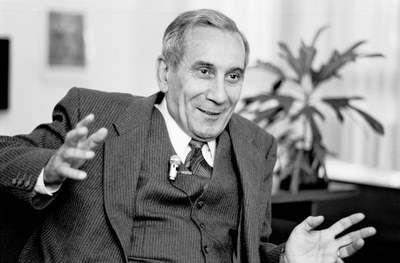World churches leaders pay tribute to ecumenical leader from Uruguay

Tributes have been paid to Rev. Emilio Castro, the former general secretary for the World Council of Churches and a leading ecumenical voice, who died on Saturday at the age of 85.
Castro died in his native Uruguay on Saturday after a lifetime of service toward uniting disparate Christian communities.
A Methodist pastor with a doctorate in theology, Castro served as the WCC's general secretary from 1982 to 1992.
"Castro [made] great contributions towards the WCC's work on the mission of the church, justice and peace," said Rev. Olav Fyske Tveit, the current general secretary of the WCC Monday.
Tveit, who was elected to his post within the WCC in 2009, credits Castro's leadership and advice as an important influence.
"He strongly encouraged me and was optimistic for the future of the ecumenical movement," he said.
Born in 1927, Castro studied Protestant theology at Basel, Switzerland. He received his doctorate from the University of Lausanne and discovered a calling to preach in South America.
"Castro was one of the most outstanding ecumenical leaders in Latin America," said Rev. Walter Altmann, who is the moderator for the WCC's main governing body, its central committee.
"An eloquent preacher, he could convincingly link the call to mission to social commitment… Opposition to military dictatorships in Latin America in the 1970s and 1980s was definitely a consequence of faith in Christ committed to love the neighbors."
His ability to unite the various churches in Argentina following the collapse of military leadership during the 1980s was one of the most crucial steps for human rights advocacy on the continent.
Julio Murray, an Anglican Bishop and president of the Latin American Council of Churches (CLAI), even compared Castro's leadership for the Latin world to a prophetic vision.
Castro also worked throughout the mid-20th century to connect Christians in many of the world's troubled locations.
He began working with the Christian Peace Conference in the 1950s and participated in their "Christian General Assembly for Peace" in Prague during 1964.
It was around the time that he became a vice president for the organization that he started collaborating with the WCC.
Castro joined the WCC as director of the Commission on World Mission and Evangelism (CWME) in 1973.
"As director of CWME, Castro paved the way for the active participation of churches from Eastern European countries in the life of the council," Tveit said.
"His personal leadership was crucial for the production of 'Mission and Evangelism: An Ecumenical Affirmation,' considered the most important and comprehensive statement on mission by the World Council of Churches, adopted in 1982 after lengthy discussions with churches all over the world."
During his tenure as secretary general, Castro drew awareness for his pointed sermons on the need for social ethics, as well as the necessity to change some of the economic and social order.
It was also under his leadership that the first delegation of the WCC visited South Africa following the release of Nelson Mandela. Castro and the WCC had been strong critics of apartheid for years prior to the trip.
Castro died in Montevideo, Uruguay.
He is survived by his children Ruth and Emilio, as well as their families.